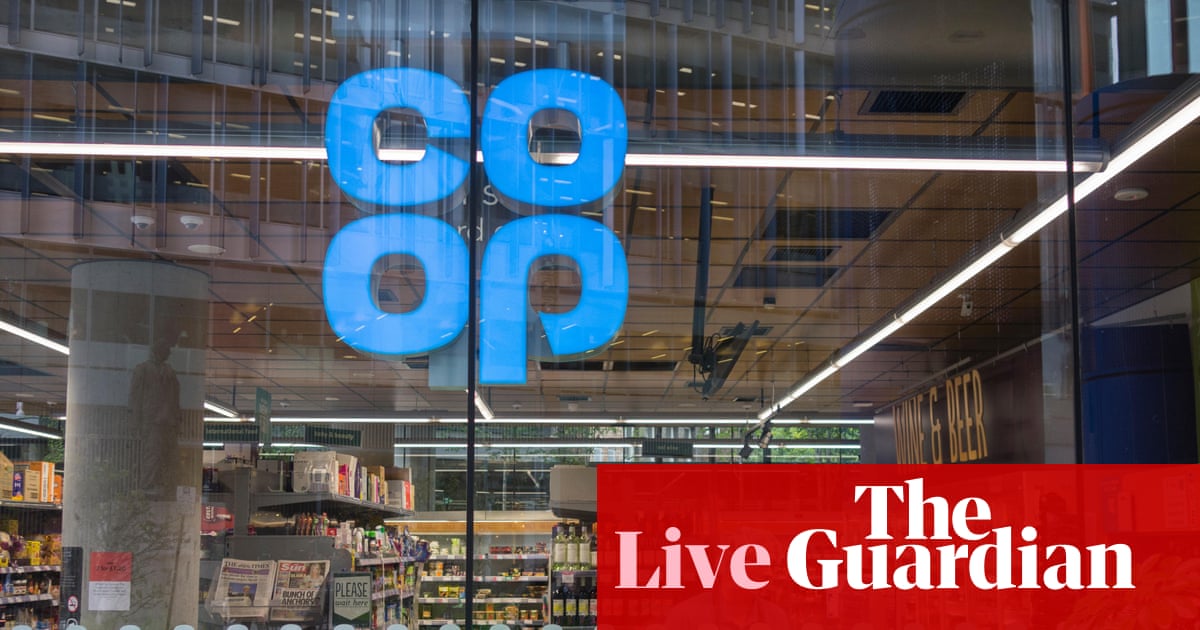Good morning, and welcome to our rolling coverage of business, the financial markets and the world economy.
The spectre of cybercrime is stalking UK companies this year, as a swathe of big name companies fall victim to hacks.
This morning, the Co-operative Group is lifting the lid on the costs of its own cyber incident this year, and it’s not a cheap picture.
The Co-op’s latest financial results, just released, show that the hack which disrupted its systems earlier this year has cost it a totall of £80m – including £20m in one-off costs tackling the problem.
It also estimates a £206m hit to its revenues, after the hack led to gaps on shelves in its grocery store and disrupted its funeral parlours.
The Co-op says it “acted quickly and decisively” to temporarily shut down a number of systems, after being targeted by a “sophisticated cyber attack”.
It adds that it kept essential services running, such as funerals, and prioritised getting stock to rural ‘lifeline’ stores, supporting independent co-op societies and franchise partners, and gave its members a £10 discount on a £40 shop.
Carmaker Jaguar Land Rover is midway through its own cyber-attack, with its factories shut until at least 1 October.
The government is looking at ways to financially support the companies in Jaguar Land Rover’s (JLR) supply chain.
That could include buying parts from Jaguar Land Rover’s suppliers in a plan to protect manufacturing jobs there.
My colleague Lauren Almeida explains:
Buying parts is said to be one of several options under consideration. But it would be technically difficult, because the carmaker does not have significant spare warehouse space to store extra parts, which are supplied in huge volumes.
Such a scheme would also be based on the idea that JLR has not suffered a permanent loss of sales due to the shutdown. The scale of any government purchase could be “very significant”, ITV News said.
The agenda
8.30am BST: Switzerland interest rate decision
1.30pm BST: US weekly jobless figures
1.30pm BST: US trade data for August
3pm BST: US existing home sales for August
Updated at 02.54 EDT
Key events
Please turn on JavaScript to use this feature
Switzerland’s central bank has left interest rates unchanged today, at 0%.
The Swiss National Bank held rates unchanged, saying “inflationary pressure is virtually unchanged compared to the previous quarter,” with inflation rising from -0.1% in May to 0.2% in August.
That leaves Switzerland with the lowest interest rates among major central banks.
ShareUK vehicle production falls to lowest since 1956
UK automotive production fell last month to a near 70-year low, even before the impact of the JLR shutdown.
The Society of Motor Manufacturers and Traders (SMMT) has reported that combined UK vehicle production dropped by 18.2% in August to 38,693 units, the weakest performance since 1956.
The SMMT says it illustrates “the challenging environment facing UK automotive manufacturers, with soft conditions in the sector’s largest market, the EU, significant cost pressures, model transitions and slow economic growth.”
August is traditionally the quietest month of the year, as carmakers schedule summer shutdowns when they can carry out maintenance and retooling. We’ll see the impact of the JLR shutdown in a month’s time, when September’s production data is released.
Emily Sawicz, associate director and industrials senior analyst at consultancy RSM UK, says carmakers are facing “significant cost pressures, sluggish sales and economic stagnation”, adding:
“The recent suspension of production at the UK’s largest automotive employer following a cyber-attack cannot be seen in the data as yet, but this will impact overall production expectations for 2025 – contributing to what remains a challenging transition year for the sector.
August’s year-on-year fall demonstrates that conditions are tough as manufacturers navigate the shift towards electric vehicles (EVs).
Updated at 03.42 EDT
Andy Street urges government to offer cash loans to JLR suppliers
Sir Andy Street, mayor of the West Midlands, is calling on the government to provide cash loans for companies in Jaguar Land Rover’s supply chain.
Street told Radio 4’s Today Programme that JLR is a “huge success story”, which drives the whole of the West Midlands’ economy. But the hack which has forced JLR to halt production since the start of September is now hurting “very successful businesses” in its supply chain.
Street welcomes the news that the goverment is now considering support for suppliers.
But he is cool about the suggestion the government could start buying parts itself – pointing out that it is not an expert in the JLR supply chain. Restarting that supply chain will be very complex, he warns.
So, with the government ruling out a furlough scheme, Street favours the third option – cash loans.
He says this would allow “a relatively small number of well known, highly efficient, highly reputable businesses” to maintain their liquidity, so they can still steer their business, and employ people.
Street insists this support for suppliers, not JLR itself, would be “a good deal” for the Treasury:
JLR itself is not asking for a single penny of taxpayers’ money.
JLR and Tata, who stand behind them, are losing hundreds of millions of pounds a week at the moment, and they – to best of my knowledge, I did check this yesterday with the company – They are not asking for any public money.
The issue is separate businesses that could not have expected that. Is it appropriate to use a relatively small amount of public money to sustain them through to future success. That’s the principle here. And I would argue, if you think of the total income that JLR and its supply chain put into the exchequer, this is a good deal for the exchequer.
Share Photograph: Nicholas.T Ansell/PA
Sofa retailer DFS Furniture has flagged that UK consumer confidence remains low, despite reporting a jump in orders, revenues and profits in the last year.
DFS’s CEO, Tim Stacey, told shareholders this morning:
“The market demand drivers for the upholstery sector remain delicately balanced.
Consumer confidence remains below the long term average and inflation remains elevated but housing transactions have been recovering, consumer savings levels are relatively high and interest rates look set to fall.
DFS posted a 10.2% jump in like for like orders in the last year (to the end of June), and a pre-tax profit of £32.9m, up from a £1.7m loss in the previous year (when it was hit by higher interest rates and shipping delays).
ShareBlow to London stock market as Petershill Partners plans to quit

Lauren Almeida
Petershill Partners, the £2.5bn investment group backed by Goldman Sachs, has said it plans to quit the London Stock Exchange, in yet another blow for the UK stock market.
The company said despite its “strong operating and financial performance”, its share price and valuation “has, in the view of the board, not appropriately reflected the quality and underlying value of the company’s assets, its strong financial performance and attractive growth prospects”.
Petershill’s board has therefore concluded the company should “proceed with a delisting and that free float shareholders should be provided with the means to realise their investment for cash at a valuation that appropriately reflects the company’s attributes.”
Petershill, which was founded in 2007 within Goldman and is still mostly owned by the US investment bank, said it would return $921m in cash back to its investors.
Its departure marks another setback for London’s stock market, after the online payments company Wise said this summer it wanted to dual list its shares in the US and the UK in an attempt to attract more investors and boost its value.
Last year, the construction equipment rental company Ashtead announced it would move its primary listing to the US, following companies such as the gambling group Flutter Entertainment and the building materials provider CRH.
In July, the drugmaker Indivior cancelled the secondary listing it had retained in London after switching its main stock listing to the US last year.
The Co-op’s chief executive, Shirine Khoury-Haq, says the hack has highlighted areas the group needs to improve.
Khoury-Haq says today:
“When we experienced a significant cyber attack, that financial strength allowed us to respond as a member-owned organisation. I’m very proud of how we reacted: we kept trading, prioritised colleagues and vulnerable communities, and launched a partnership with The Hacking Games to tackle youth disenfranchisement – the root of many cyber threats.
“The cyber attack highlighted many of our strengths. But more importantly, it also highlighted areas we need to focus on – particularly in our Food business. We’ve already started on this journey, refining our member and customer proposition, making structural changes to our business, and setting our Co-op up for long-term success.”
ShareHack pulls Co-op into an H1 loss
The £80m cost of this year’s cyber-crime attack has pushed the Co-operative Group into a loss, today’s financial results show.
The Co-op has reported a pre-tax loss of £50m for the first half of this year, down from a £58m profit in the first six months of 2024.
Debbie White, chair of the Co-op, says:
“The first half of 2025 brought significant challenges, most notably from a malicious cyber attack.
Our balance sheet strength and the magnificent response of our 53,000 colleagues enabled us to maintain vital services for our members and their communities. We must now build our Co-op back better and stronger to meet the challenges and opportunities that lie ahead.”
ShareIntroduction: Co-op hack wipes out £80m of profits
Good morning, and welcome to our rolling coverage of business, the financial markets and the world economy.
The spectre of cybercrime is stalking UK companies this year, as a swathe of big name companies fall victim to hacks.
This morning, the Co-operative Group is lifting the lid on the costs of its own cyber incident this year, and it’s not a cheap picture.
The Co-op’s latest financial results, just released, show that the hack which disrupted its systems earlier this year has cost it a totall of £80m – including £20m in one-off costs tackling the problem.
It also estimates a £206m hit to its revenues, after the hack led to gaps on shelves in its grocery store and disrupted its funeral parlours.
The Co-op says it “acted quickly and decisively” to temporarily shut down a number of systems, after being targeted by a “sophisticated cyber attack”.
It adds that it kept essential services running, such as funerals, and prioritised getting stock to rural ‘lifeline’ stores, supporting independent co-op societies and franchise partners, and gave its members a £10 discount on a £40 shop.
Carmaker Jaguar Land Rover is midway through its own cyber-attack, with its factories shut until at least 1 October.
The government is looking at ways to financially support the companies in Jaguar Land Rover’s (JLR) supply chain.
That could include buying parts from Jaguar Land Rover’s suppliers in a plan to protect manufacturing jobs there.
My colleague Lauren Almeida explains:
Buying parts is said to be one of several options under consideration. But it would be technically difficult, because the carmaker does not have significant spare warehouse space to store extra parts, which are supplied in huge volumes.
Such a scheme would also be based on the idea that JLR has not suffered a permanent loss of sales due to the shutdown. The scale of any government purchase could be “very significant”, ITV News said.
The agenda
8.30am BST: Switzerland interest rate decision
1.30pm BST: US weekly jobless figures
1.30pm BST: US trade data for August
3pm BST: US existing home sales for August
Updated at 02.54 EDT
